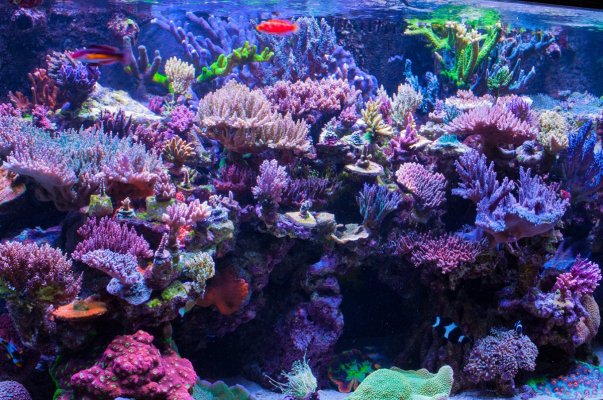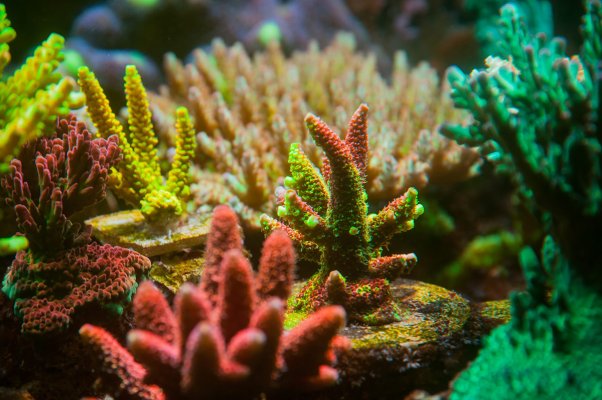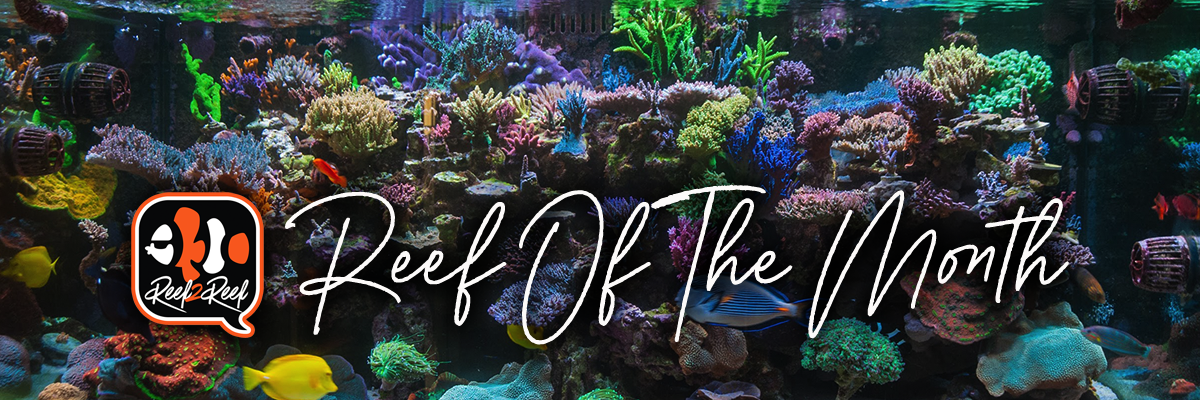Introduction:
My name is Garry and I was born in beautiful city of Odessa, Ukraine which is located on the shore of Black Sea. There I kept freshwater fish for as long as I can remember. When I immigrated to this country 34 years ago, I started saving a few dollars here and there and got my first glass tank at a garage sale. This was the beginning of my freshwater tank journey in USA. Within the year, I already had four of them in the small apartment with my wife and two children.
Before diving into the saltwater reef tank, I did a lot of reading and research. Special thanks goes out to Reef2Reef community, who gave me tons of knowledge and guidance from experienced reefers. I started with 280 gallon reef which happens to be my first and only reef tank (not counting Frag tank that was added 3 years ago, when my corals started to overgrow the tank).
My display tank is packed to the brim with healthy corals (of course, I’m always trying to make some real estate space for something new). Despite my tank being 90% acropora dominated, I also love other corals as well: Flower pots, torches, mushrooms, anemones, Montipora species, chalices, clam, frogspawn and others.
I attribute my success to my local friend in the hobby (David, owner of Vivid Aquariums) who helped me with the setup and who guided me and taught me from A-Z in the beginning. Many thanks go out to gurus in this hobby: Joe, owner of Unique Corals (@uniquecorals), Steve Garrett from Garrett Acropolis; Dave Botwin, and Eliot from @GoldenStateCorals (just to name a few) who have helped me along the way.
My tank has been running for nine and a half years. Of course, this has not been without some hiccups, especially in the first three years, feeling like it was a complete failure. Fish disease, leak in the tank, and understanding water chemistry were just a few of the challenges that I had to overcome. Patience, dedication and perseverance helped me to conquer these obstacles.
A few pictures from when the tank was being set up:
Full Tank Shot from a couple of years ago

System Profile:
- Display tank: Custom 72 x 30 x 30 Eurostyle tank, 280 gal
- Glass or Acrylic: Glass
- Stand: Custom wood stand 36 inches tall; canopy 20 inches tall
- Sump: Custom 48 x 24 x 20 acrylic, holds approx. 40 gal of water.
- Protein skimmer: Super Reef Octopus 3000 Int. Due to nutrients increase, I have installed a second skimmer: Bubble Magus Curve 9.
- Carbon/phosphate filtration: GFO Reactor and active carbon in a mesh bag
- Return pump: Reeflo Snapper Dart
- Water circulation: Closed loop powered by dedicated Reeflo pump with a 4 way Ocean Motion device; 2 x MP60 and 2 x MP40.
- Calcium/alkalinity/magnesium dosing equipment: Bubble Magus Dosing 3 pump unit.
- Lighting (display): 6x EchoTech Radion Pro Gen 4 supplemented with 10 x T5, mounted about 16 inches above the water line.
- Auto top-off: Spectrapure
- Heating/cooling: Heating: 300 Watt Eheim heater; Cooling: JBJ Arctica 1/3 HP - both controlled by Apex
- System control: Apex
- Grow-out tank: Custom glass 72 x 18 x 12 tall
- Lighting (grow-out): 3 x EcoTech Radion Pro Gen 4
- Flow (grow-out): 1 x MP10 and 1 x MP40
- Any other details: No filter socks; 2 x Canopy fans for air circulation
Water Circulation is very important in the SPS dominated tank, it should be as random as possible. MP60 and MP40 change the mode every 2 hours. They turn on at 100% four times a day for 10 min in order to blow off any detritus which accumulates on the corals.
Water Parameters:
- Temp: 78-79° F
- pH: 7.9 – 8.1
- Specific gravity: 1.025 – 1.026
- NO3: 10-15
- Ca: 430-450
- Alk: 7.5 -8.5
- Mg: 1350 -1450
- PO4: 0.09- 0.14
What salt mix do you use? Red Sea Coral Pro
What kind of rock did you start with? A combination of Live and Dry rocks
What is your substrate? 3” Carib Sea Sand
Calcium/Alkalinity/Magnesium Summary and Objectives: Not trying to chase specific numbers, just keep them in the acceptable range.
What and how do you dose for the big 3 (alk/cal/mag)? Dosing for Alk/cal/mag via dosing pump with Brightwell products.
Are you dosing anything else for your reef health (carbon dosing, aminos, etc.)? Not a big fan of dosing any other chemicals to my system. I do add Vitamin C and Yeast randomly.
Lighting Summary and Objectives: Since I consider myself an old school reefer, I prefer whiter light in my tank. Running at 80% of both whites for the duration of 7 hours.
Lighting Photoperiod:
- Display tank: 11 Hours
- Grow-out tank: 10 Hours
Filtration and Water Quality Summary and Objectives: Water quality is the most important subject in reef-keeping. I try to keep all of the parameters in the acceptable range. If something is out of range, I slowly correct the issue.
What is your export strategy? 2 skimmers, GFO Reactor, 20% water changes every other week.
What is your maintenance routine?
Daily:
- Observe, inspect and correct as needed livestock and equipment.
- Feed the fish.
- Clean the glass 2 times a week
- Top off alc/mag and calcium in the containers.
- 3-4 times a year I send off for an ICP test.
- A few times a year I clean pumps and blow my sand and rocks with turkey baster.
- 3 x Yellow Tang
- Black Tang
- Hippo Tang
- Sohal Tang
- Desjardini Tang
- 4 x Clownfish
- Pair of Hawaiian Flame Wrasse
- Pair of Femininus Wrasse
- Melanurus Wrasse
- Royal Gramma
- Diamond Goby
- Long Nose Hawkfish
- Flame Hawk
- Filefish
Tank Inhabitants — Other Invertebrates:
- Large amount of different snails
- 3 x Cleaner shrimp
- 3 x Flame Shrimp
- 4 x Sea Urchins
- Tiger Tale Cucumbers
- Fighting Conches – 15 x
Over 100 different acropora corals from green slimer and bird nest to the more sensitive acropora speciosa, branching and plating montipora species, couple of chalices, mushrooms, clam, frogspawn, flowerpots, and a few other LPS corals.
Fish and Coral Feeding:
I do not feed the corals directly. For fish feeding, I alternate between frozen food and pellets, Nori – 4 x a week.
How did you decide what to keep in your tank?
In regards to corals, I usually collect what catches my eye. As far as the fish and invertebrates – Should be reef safe (don’t eat corals).
Any stocking regrets?
- Red carpet anemone. It ate quite a few of my expensive fish. Got rid of him few years ago (over 12 inches across).
- Six Line wrasse - very, very mean fish.
I will not keep any fish that are not reef safe.
I also will not keep any invasive corals like GSP and xenia.
What do you love most about the hobby?
I love the beauty of the corals in general. The growth of a little frag into a gorgeous colony fascinates me.
How long have you been doing this? 9 ½ years
Who was responsible for getting you into the hobby? Me, myself and I
Who or what in the hobby most influences/inspires you?
The most inspiring for me are the hobbyists, who have been keeping corals for 30+ years straight.
If you could have any tank, what size would it be and why?
The largest that I can afford to keep full of a vast variety of corals and fish.
Favorite fish?
Lennardi Wrasse and Choati Wrasse
Favorite coral?
Honestly, I love them all, but Tyree Daniella is very special for me as it was named after my granddaughter at the time she was born.
Favorite invert?
Love them all.
How do you typically get over setbacks?
Step back, find the cause, take a deep breath, and don’t make quick irrational decisions that you may regret later. Do not panic. Slowly but surely correct the issue and move on.
Have you faced any major challenges with this particular tank, and if so, how did you overcome?
Yes, just like many other reefers. I try not to use chemicals to solve the issue, but instead try to find a natural remedy (e.g. for overgrowth of bubble algae, I use emerald crab; for aiptasia, I bought berghia nudis; explosion of asterina starfish – implemented harlequin shrimp; for majano – filefish, and so on…).
Any special tips for success or advice you'd like to share with other reefers?
Patience, dedication and perseverance. Do not over react, when problems arise, step back and analyze the issue before you make a final decision. Talk to experienced reefers (who have had a successful reef tank) and see if they have a better solution for your situation. It will help you to not reinvent the wheel.
Final Thoughts?
Keep it simple. Do not overcomplicate. Keep the water chemistry in range. Test often. Do not be cheap on the important equipment (i.e. lights, pumps, etc.).
Conclusion: I really enjoy collecting modern SPS’s as well as old school corals. Most of them seem to be happy and thriving in my tank. This collection of corals creates jaw dropping colors and shapes within the tank. My supportive wife and I really enjoy looking at the tank every available moment in time and spend relaxing evenings watching this beauty.

















